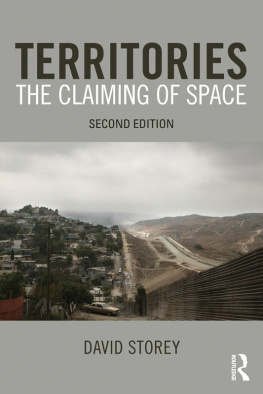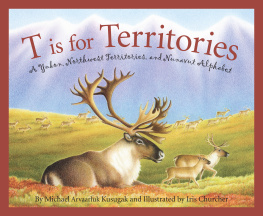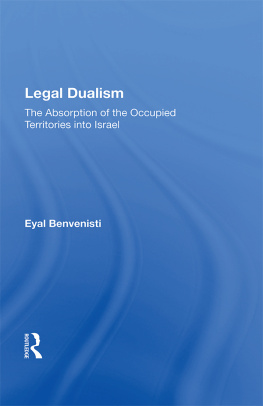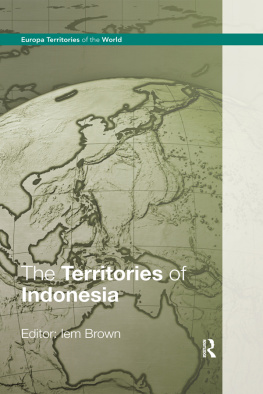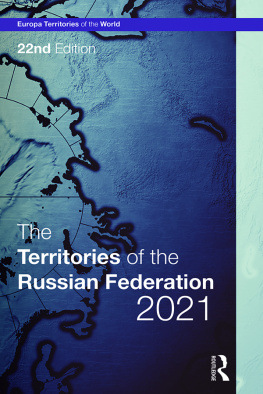David Storey - Territories
Here you can read online David Storey - Territories full text of the book (entire story) in english for free. Download pdf and epub, get meaning, cover and reviews about this ebook. year: 2012, publisher: Taylor and Francis, genre: Politics. Description of the work, (preface) as well as reviews are available. Best literature library LitArk.com created for fans of good reading and offers a wide selection of genres:
Romance novel
Science fiction
Adventure
Detective
Science
History
Home and family
Prose
Art
Politics
Computer
Non-fiction
Religion
Business
Children
Humor
Choose a favorite category and find really read worthwhile books. Enjoy immersion in the world of imagination, feel the emotions of the characters or learn something new for yourself, make an fascinating discovery.
- Book:Territories
- Author:
- Publisher:Taylor and Francis
- Genre:
- Year:2012
- Rating:5 / 5
- Favourites:Add to favourites
- Your mark:
- 100
- 1
- 2
- 3
- 4
- 5
Territories: summary, description and annotation
We offer to read an annotation, description, summary or preface (depends on what the author of the book "Territories" wrote himself). If you haven't found the necessary information about the book — write in the comments, we will try to find it.
Territories — read online for free the complete book (whole text) full work
Below is the text of the book, divided by pages. System saving the place of the last page read, allows you to conveniently read the book "Territories" online for free, without having to search again every time where you left off. Put a bookmark, and you can go to the page where you finished reading at any time.
Font size:
Interval:
Bookmark:
Territories
Politics and political relationships underpin the world we live in. From the division of the earths surface into separate states to the placement of keep out signs, territorial strategies to control geographic space can be used to assert, maintain or resist power and as a force for oppression or liberation. Forms of exclusion can be consolidated and reinforced through territorial practices, yet they can also be resisted through similar means. Territoriality can be seen as the spatial expression of power, with borders dividing those inside from those outside.
This extensively revised and updated second edition continues to provide an introduction to theories of territoriality and the outcomes of territorial control and resistance. The book emphasizes the underlying processes associated with territorial strategies and raises important questions relating to place, culture and identity. Key questions emerge concerning geographic space: who is allowed to be in particular spaces? and who is barred, discouraged or excluded? The text explores the construction of territories and the conflicts which often result using a range of examples drawn from various spatial scales and countries. It ranges in coverage from conflicts over national territory, such as Israel/Palestine, Northern Ireland and South Ossetia, to divisions of space based around class, gender and ethnicity. This second edition also contains new contemporary debates on nationalism, territorialization, globalization and borders. It casts light on the territorial consequences of the war on terror and the conflicts in Iraq and Afghanistan. It also examines issues such as migration, the territorial expansion of the European Union and territorial divisions in the home and workplace.
Written from a geographic perspective, Territories is an interdisciplinary text drawing upon ideas and material from a range of academic disciplines. The text is richly illustrated throughout with figures, boxed case studies and end of chapter further reading. It will be of interest to undergraduates and graduates studying political geography, politics and international relations.
David Storey is a Senior Lecturer in Geography at the University of Worcester, UK.
Territories
The Claiming of Space
Second edition
David Storey

First published 2001
as Territories: Nations, States and the Claiming of Space
by Pearson Education
This edition published 2012
by Routledge
2 Park Square, Milton Park, Abingdon, Oxon OX14 4RN
Simultaneously published in the USA and Canada
by Routledge
711 Third Avenue, New York, NY 10017
Routledge is an imprint of the Taylor & Francis Group, an informa business
2012 David Storey
The right of David Storey to be identified as author of this work has been asserted by him in accordance with sections 77 and 78 of the Copyright, Designs and Patents Act 1988.
All rights reserved. No part of this book may be reprinted or reproduced or utilised in any form or by any electronic, mechanical, or other means, now known or hereafter invented, including photocopying and recording, or in any information storage or retrieval system, without permission in writing from the publishers.
Trademark notice: Product or corporate names may be trademarks or registered trademarks, and are used only for identification and explanation without intent to infringe.
British Library Cataloguing in Publication Data
A catalogue record for this book is available from the British Library
Library of Congress Cataloging-in-Publication Data
Storey, David, 1960
Territories / David Storey. 2nd ed.
p. cm.
Includes bibliographical references and index.
1. Political geography. 2. Nationalism. 3. Nation-state. 4. Territory,
National. I. Title.
JC319.S76 2011
320.12dc23 2011024555
ISBN: 9780415575492 (hbk)
ISBN: 9780415575508 (pbk)
ISBN: 9780203854570 (ebk)
Contents
Figures
Acknowledgements
There are many people who have helped (wittingly or unwittingly) in the completion of this book. I have been fortunate to enjoy the support of many colleagues at the University of Worcester; in particular I am grateful to Heather Barrett, Alan Dixon, Nick Evans and John Fagg. Many others including Ronnie Kowalski (sadly missed), James Sidaway, Michael Holmes, Andy Storey and Jennifer Storey have in various ways contributed to this work. Over the years, many students at Worcester have engaged with the issues raised here and have provided useful feedback. The university also granted a period of research leave without which the book would not have been completed. Faye Leerink at Routledge provided much useful advice and assistance throughout and speeded the process up through the sending of numerous email reminders (though these were not always appreciated at the time!). Tamsin Ballard, Richard Willis, Janice Baiton, Lisa Salonen and the production team provided advice and guidance, and helped in constructing the maps. Thanks to you all, and to the many others not mentioned here. Anne undertook the practical task of proofreading and critically commenting on the manuscript but, more importantly, I am indebted to her for dealing cheerfully with my whims and downright foolishness, enduring my mood swings and obsessions, and for displaying remarkable understanding and patience.
1 Introduction
We live in a highly territorialized world where we are regularly confronted with signs such as authorized personnel only, no trespassing, prohibido el paso, and so on. Such everyday warnings and admonishments are a reflection of attempts to impose forms of power (through rules and regulations) over portions of geographic space (Figure 1.1). They are manifestations of the intersections between geography and politics and are highly visible reminders of the ways in which power is imposed, accepted or resisted. Political geography draws attention to the spatial dimensions of power, dealing with political phenomena and relationships at a range of spatial scales from the global down to the local. The sub-discipline revolves around the intersections of key geographical concerns of space, place and territory on the one hand and issues of politics, power and policy on the other.
A glance at the global political map provides us with the most obvious manifestation of the territorial dimension to politics in the division of the earth into separate countries or states. However, this macro-scale territorialization is accompanied by a myriad of much more micro-scale variants including those mentioned above. In everyday usage, territory is usually taken to refer to a portion of geographic space which is claimed or occupied by a person or group of persons or by an institution. Following from this, the process whereby individuals or groups lay claim to such territory can be referred to as territoriality. However, as will be seen, these somewhat simplified definitions mask considerable complexity. The investigation of various dimensions of territorial formation and behaviour at different spatial scales forms the central focus of this book. It considers the ways in which territories are produced and explores how territoriality is used as a strategy to assert power or to resist the power of others. It examines the meanings of territory, the construction of territories and the use of territorial strategies at the level of the state, sub-state divisions, at the micro-scale level in individual localities, in the workplace and

Figure 1.1 No Entry sign
Next pageFont size:
Interval:
Bookmark:
Similar books «Territories»
Look at similar books to Territories. We have selected literature similar in name and meaning in the hope of providing readers with more options to find new, interesting, not yet read works.
Discussion, reviews of the book Territories and just readers' own opinions. Leave your comments, write what you think about the work, its meaning or the main characters. Specify what exactly you liked and what you didn't like, and why you think so.

